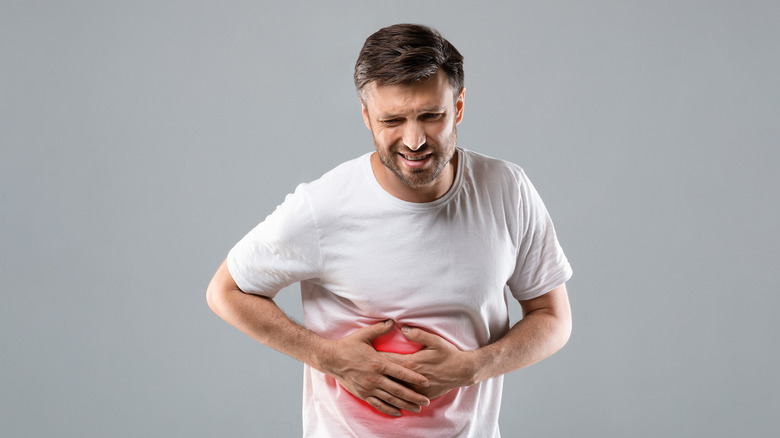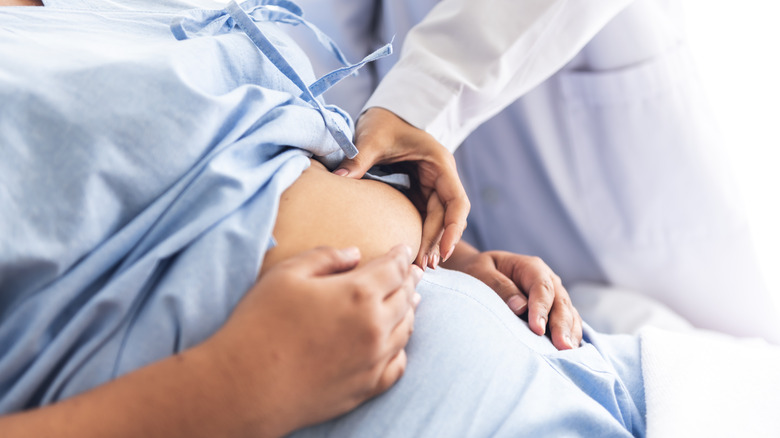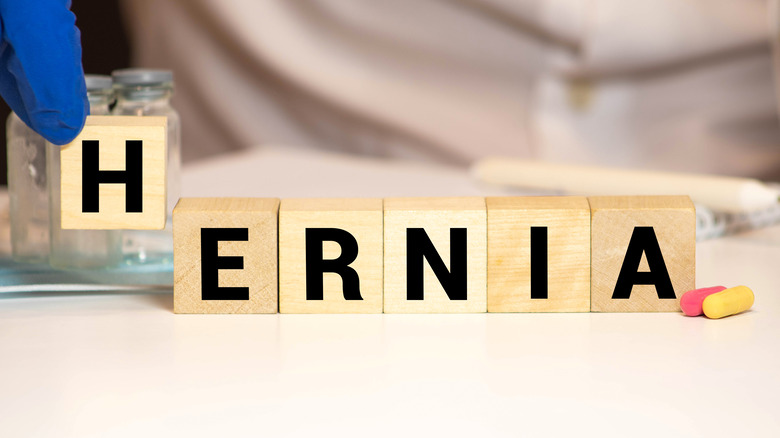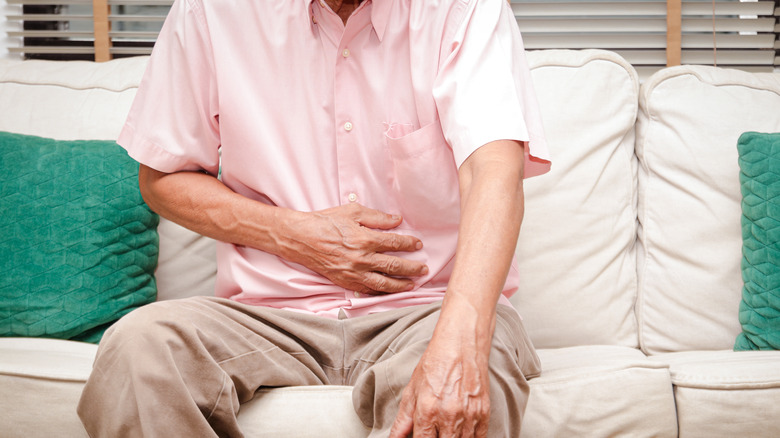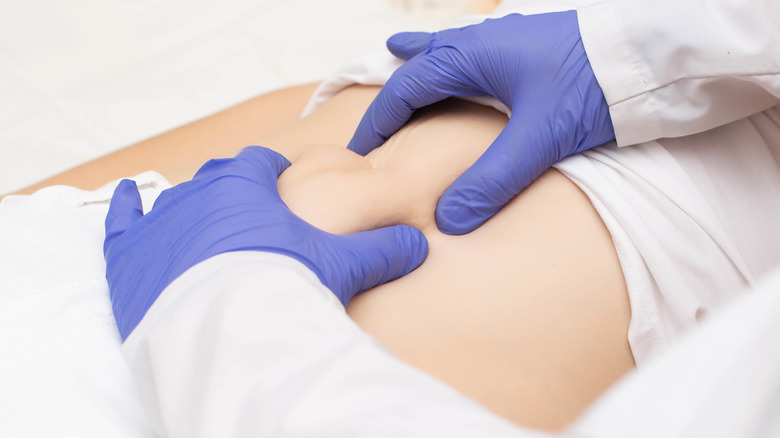How To Identify If You Have A Hernia
Are you having an aching sensation in your belly or groin that you think may be due to a hernia? While many things could be causing your pain, understanding hernias and their symptoms can help you determine if this is the cause of your discomfort.
A hernia occurs when there is a weak area in the muscle or connective tissue (fascia) which allows either an organ, such as the intestine, or some fatty tissue to poke through. According to WebMD, hernias can be present when you are born or they can develop later in life.
Hernias can occur anywhere on the body, says 10FAQ Health, but the groin and abdomen are the most common sites. They may also occur following surgical procedures around the area of the incision.
When you have a hernia, it can be quite painful, especially when you cough, bend over, or lift heavy objects, says the Mayo Clinic. Alternatively, it may not cause any pain.
Hernia risk factors
Stamford Health explains that anything which strains the abdominal wall can make a person more likely to get a hernia. This can include things like chronic coughing or lifting heavy objects without stabilizing your muscles. Also, things that stretch the abdominal wall, like weight gain or pregnancy, can predispose a person to getting a hernia.
Surgical procedures can make the abdominal wall weaker too, with any infection at the site of the incision increasing the risk since it prevents the fascia from healing properly.
Hernia Center of Southern California states that smoking can also make people more susceptible to hernias because the nicotine found in tobacco can decrease the rate of collagen formation, making the abdominal wall weaker. They note that people who smoke are four times more likely to have recurrent hernias because of impaired wound healing.
Finally, some people are born with naturally weaker connective tissue, which makes them more prone to having hernias, says Stamford Health.
Types of hernias
The Cleveland Clinic writes that there are a few common types of hernias. The most common type is the inguinal hernia, in which fatty tissues or the intestine poke into the groin at the top of the inner thigh. Meanwhile, femoral hernias occur when fatty tissues or the intestine protrude into the groin. Umbilical hernias occur when fatty tissues or the intestine pokes through near the belly button. Hiatal (hiatus) hernias occur when the top of the stomach protrudes through the diaphragm (the muscle that separates the abdomen from the chest) into the chest cavity.
There are other less common types of hernias as well. Epigastric hernias occur when fatty tissues stick through the abdominal wall between the belly button and the lower part of the breastbone. Spigelian hernias occur when the intestine pushes though below the belly button. Diaphragmatic hernias occur when the abdominal organs move through an opening in the diaphragm up into the chest. This type of hernia is due to a birth defect that leaves a hole in the diaphragm, according to the U.S. Centers for Disease Control and Prevention.
Finally, there are incisional hernias. Mt. Sinai explains that these occur where there are healing surgical scars.
Signs and symptoms of a hernia
According to the Cleveland Clinic, one sign of a hernia in the abdomen or groin is a lump or bulge. This lump can be pushed back in. It might also go away when you lie down. Doing things like crying, coughing, laughing, or straining during a bowel movement may make the lump pop back out. Over time, the bulge can grow in size.
The area of the bulge may be painful. Additionally, it can hurt when you lift things. You might also feel a dull ache, a sensation of fullness, or signs that your bowel is blocked. A hernia in the groin may cause swelling or bulging in that area. In men, the bulging might occur in the scrotum.
However, hiatal hernias might exhibit different symptoms from the other types. Rather than having external bulges or lumps, the Mayo Clinic says you might have symptoms like indigestion, heartburn, problems swallowing, shortness of breath, chest pain, or signs of gastrointestinal bleeding like blood in your vomit or black stools. Small hiatal hernias may have no symptoms at all.
See your doctor if you have any concerning symptoms.
Hernia treatments
If you have an untreated hernia, certain complications may occur, says the Cleveland Clinic. The hernia may grow larger or cause more pain. In some cases, part of the intestine can get stuck in the inguinal canal, causing pain, vomiting, or nausea. Moreover, part of the intestine can get trapped in a way that cuts off its blood supply, necessitating immediate surgery in order to prevent tissue death.
If your hernia requires treatment, Healthline explains that this can be done surgically. Holes can be repaired by patching them with surgical mesh. Other times, when stretching of an opening has occurred, surgery might be performed to tighten it.
Hernia repair is either done through open surgery or laparoscopic surgery.
In open surgery, an incision is made near the location of the hernia. The bulging tissue is then pushed back into place. Finally, the weakened area may be reinforced with surgical mesh and the incision closed.
MedStar Health explains that laparoscopic surgery involves making three to four small incisions and inserting a tiny camera and miniature surgical equipment in order to make the repair. This type of surgery is less invasive and does less damage to the surrounding tissue. There is also less risk of infection, less pain, and quicker recovery times. However, it is not appropriate for all cases, they note. It is best for smaller, less complex hernias.
Hernia prevention
In many cases, hernias can be prevented by adhering to certain practices, says Kettering Health.
They advise that one way to prevent a hernia is by using proper lifting techniques, like lifting slowly with your body properly aligned and not lifting more weight than you can comfortably handle. You should bend from your knees rather than your waist and use your leg muscles to lift while keeping your back straight. Get help or use tools to assist you if needed. Warm up your muscles prior to lifting as well. Finally, stop immediately if you feel pain. This is a sign that something is wrong, they say.
The also recommend maintaining a healthy body weight. Being too heavy can put more pressure on the abdominal wall, they explain, which weakens the muscles over time.
To keep abdominal muscles strong, they suggest working on your core strength. Core exercises work the muscles of the abdomen and pelvic region so they are less prone to weakness.
If you have diabetes, they state it is important to work on keeping it under control. This condition can interfere with healing after hernia surgery and can lead to more complications.
Finally, they suggest that you quit smoking. Smokers are prone to chronic coughs, which can contribute to the development of hernias. Additionally, according to the Hernia Center of Southern California, the nicotine content of tobacco can reduce collagen production, making your abdominal wall weaker.

